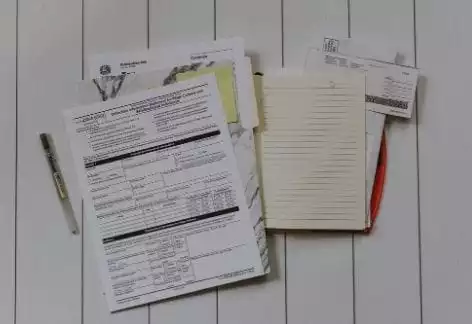IRS Penalties are one of the ways they try to urge taxpayers to consider their tax debt more seriously. Learn how to avoid them before it hurts you.
There are some penalties that are worse – and more surprising – than others. Knowing what IRS penalties they can send your way and how best to avoid them can keep a simple tax debt from becoming a crippling financial burden.
Sometimes, life can spin out of control or lead us into circumstances we never intended to face, and things like a late tax return or an overdue tax balance of a few thousand dollars seem far less important than much more pressing, immediate, and perhaps even existential worries.
But regardless of these circumstances, a debt is a debt, and the IRS commands an unparalleled arsenal for pursuing and punishing debtors. There are few ways to avoid the IRS – but you can negotiate with them and take measures to avoid unnecessary penalties and fees.
Failure to File a Tax Return
The first IRS penalty on the list is arguably the most pernicious, because it catches many indebted taxpayers off guard. If you owe a tax liability to the IRS, then you might feel that it’s pointless to send in a tax return. After all, if you can’t afford to pay your taxes, why go through the trouble of doing them at all?
Sadly, this kind of thinking can lead many taxpayers into an even greater debt trap. This is because the IRS requires all indebted taxpayers to file every late tax return for at least the last three, if not six years, when working with the IRS to eliminate a tax debt. This means that even if you cannot afford to pay your taxes, you are required by law to file your applicable tax returns and failing to do so means going back over the returns you missed and filing them after the fact if you want to have a chance at getting the IRS off your back, and fully paying off your debt.
For every month that your tax return is late, the IRS tacks on an additional 5 percent of your total tax debt, for a maximum of 25 percent after five months. This is a substantial penalty and can add a lot of volume to your debt for no reason other than the fact that you didn’t file the necessary paperwork.
Failure to Pay Outstanding Taxes
The second penalty we will discuss is the more obvious one – a penalty for failing to pay your tax balance. This is a much smaller penalty of only 0.5 percent every month, for a maximum of 25 percent after 50 months (over four years). This penalty can be halved (0.25 percent per month) if you enter a payment plan with the IRS, until your debt is fully paid.
It should be noted that this penalty does not stack with the failure to file penalty. This means that if you skip both filing this year and can’t pay your taxes, you will be charged 5 percent per month for the first five months, and then an additional 0.5 percent for each month until you enter into a payment plan with the IRS.
Failure to Pay Estimated Taxes
Some taxpayers are expected to pay estimated monthly or quarterly taxes, such as taxpayers who file as self-employed, or taxpayers who owe more than $1,000 in taxes per year after subtracting all applicable deductions and credits. Failure to make your estimated payments on time will lead to IRS penalties, based on what you owe, as well as monthly interest on your outstanding tax bill.
Sending a Failed Payment
This one may be a bit rarer but can still occur. The IRS will penalize you for any payments that failed or were rejected, from bounced checks to rejected credit cards and bank accounts. For payments of more than $1,250, the IRS will charge you an additional 2 percent of the payment as a penalty for failure.
There is Interest on Tax Debt
In addition to penalties stacking up to 25 percent of the total tax debt (50 percent of the total tax debt for both failure to file and failure to pay after about four years), there is an interest rate of 3 percent plus the current federal short-term rate on any tax liabilities a taxpayer has. This is updated every quarter, and the information can be reviewed on the IRS’s official website.
First Time Debtors Can Seek Relief
Interest and penalties can be completely wiped off of a taxpayer’s tax debt – provided this is the first time they have incurred a tax debt, or provided they were somehow unable to receive information about how their debt would grow due to not receiving notices from the IRS. These one-time forms of IRS penalties abatements are called the Penalty Relief Due to First Time Penalty Abatement, or Other Administrative Waiver. Some other requirements for having your first-time penalties waived include:
-
- Being in the process of paying back your taxes, without any bounced payments or late payments.
- All tax returns have been filed, including the late ones.
Consider Your Tax Refunds
If you are eligible for some kind of tax refund or credit, the IRS will usually pull from said refund/credit to pay for your penalties. They will generally also subtract said refund/credit from your tax liability. They will then send you a notice for whatever balance remains (whether it is a smaller refund or a liability on your end).
Other IRS Penalties On Taxpayers
Penalties and interest are meant to act as timers to get taxpayers to take action against their debt by arranging to pay it sooner – but the IRS does have other tricks up its sleeve to coerce payment in cases where a taxpayer has a substantial debt to the government and isn’t paying. The two most significant tools in the IRS’s arsenal are the federal tax lien and the tax levy.
A tax lien is a legal claim on all the property and assets a taxpayer has. It does not constitute taking anything, but rather denotes that the IRS takes precedence over any lender or creditor. Also, should the taxpayer liquidate an asset, the IRS will be first in line to receive a payment.
A tax levy is a physical claim of assets, properties, accounts, and wages. The IRS can claim non-primary residences, non-essential vehicles, take money out of your bank account, or make employers withhold a portion of their employee’s wages, until the tax debt is paid.
How Rush Can Help
IRS Penalties, interest payments, and collection actions can be terrifying. But you are not defenseless. By coming up with a swift and actionable plan, you can negotiate payment with the IRS. You may also be able to reduce your IRS penalties and eliminate your liability as soon as possible. Even taxpayers in difficult financial situations can work with seasoned tax professionals to seek a reduced liability or a delay in collection actions until things improve.
You always have options. Seek out Rush Tax Resolution for more information.

